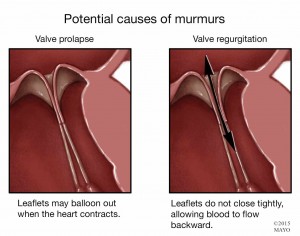 Lubb-dupp. Lubb-dupp. Those words are often used to describe the sound of a heartbeat. That steady, regular sound is made by heart valves, opening and closing as blood circulates through your heart. The term heart “murmur” refers to a different sound. A murmur is an abnormal extra sound that can be heard through a stethoscope.
Lubb-dupp. Lubb-dupp. Those words are often used to describe the sound of a heartbeat. That steady, regular sound is made by heart valves, opening and closing as blood circulates through your heart. The term heart “murmur” refers to a different sound. A murmur is an abnormal extra sound that can be heard through a stethoscope.
Sometimes, the murmur sounds like a humming; it may be faint or temporary, with onset during pregnancy or fever. As quickly as it comes, the murmur may disappear. However, a murmur could be persistent and loud, easily heard like a churning mill wheel or even like a cooing seagull, indicating a serious heart problem.
A murmur can have several causes. Mayo Clinic Health System cardiologist Michel Barsoum, M.D., says it could be a heart valve problem. "The valves in your heart act as doors between the chambers, or rooms, of the heart. When heart valves are very tight or narrow, that is called stenosis."
A murmur also could be from a leaky valve, called regurgitation, or it could be from a hole in the wall that separates the heart chambers.
Some patients have family history of heart murmur and heart disease. Some are born with a murmur. Others have had recent severe infection or illness that can damage a heart valve and need immediate medical attention.
Patients with murmur and serious symptoms, such as fever, shortness of breath, chest pain, worsening fatigue, fainting or even leg swelling, will need faster evaluation by a qualified medical provider. Other tests will be needed. An ultrasound picture of your heart, called an echocardiogram or echo, likely will be ordered to show detailed images of your heart’s structure and function.
"Some patients will need repeated evaluation over the years. Some might need antibiotics before going to the dentist to protect their heart valves from potential infection, called endocarditis, which can be spread via the bloodstream during dental work. Some patients will need surgery to treat the reason of the murmur, especially if it is from a tight or leaky valve," adds Dr. Barsoum.
For patients, it’s important to learn if their heart murmur is innocent or serious. Qualified medical providers with specialized training can help patients sort it out.







